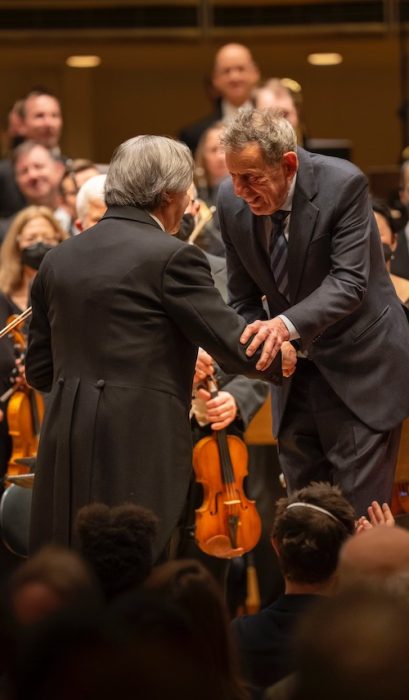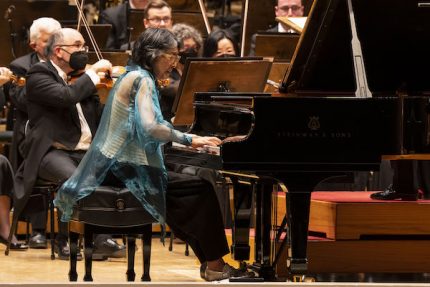Muti breaks CSO’s Glass ceiling with surging performance of Eleventh Symphony

[Editor’s Note: Technical issues prevented this review from being posted last weekend.]
It was a moving experience Friday night to see the 85-year-old Philip Glass take the stage of Orchestra Hall for the first time to an overwhelming ovation following the Chicago Symphony Orchestra’s performance of his Symphony No. 11. He warmly embraced Riccardo Muti and, clearly touched, repeatedly acknowledged the orchestra.
Credit where credit is due: it took Riccardo Muti, whose programming of American composers, past and present, has been highly selective—to finally bring a major Philip Glass work to CSO audiences.
Before this week the CSO has only played seven minutes of Glass’s music previously at Orchestra Hall, when John Adams included Glass’s “Facades” (from Glassworks) in a 1999 concert. Ravinia has fared little better with just two Glass works played by the CSO: the Violin Concerto (No. 1) in 1987 with Gidon Kremer as soloist under Ricardo Chailly and his Concerto Fantasy for Two Percussionists under James Conlon in 2005.
It boggles the mind that the most popular and prolific of living American composers has been such a non-presence in the city where he attended college (University of Chicago) and had his formative musical years. Lyric Opera has not ventured a Glass stage work since Satyagraha in 1987.
Glass is the most prolific of high-profile American symphonists with 14 works in the genre to date. (No. 13 will be unveiled in Toronto next month and performed at Carnegie Hall April 5.) That bests William Schuman’s ten symphonies and David Diamond’s eleven, and the composer is closing in on Gloria Coates (16).
That’s in addition to a dozen operas, eight string quartets, 25 other chamber works, two cello concertos, three piano concertos, two violin concertos and concertos for two pianos, and saxophone quartet and about fifty film and TV scores.
Not that this most genre-crossing of composers has needed Chicago advocacy to have a hugely successful career. From his earliest composing days, Glass’s insistent, pulsing music drew rock-loving youthful listeners as strongly as the gallery crowd. Over the decades his music has won over much of the classical music establishment, presenters and audiences, alike especially in his base in New York.
Premiered in 2017 on his 80th birthday at Carnegie Hall, Glass’s Eleventh Symphony is one of the most striking and sheerly engaging of his many works in the genre. The composer seems to be revisiting his Minimalist salad days but here the effect is heightened with a massive percussion battery, and the result is grander and more epic, concentrated and stridingly symphonic.
The first movement starts with a characteristic insistent theme in solo piano, punctuated by malign chords in lower brass, as the surging and ebbing builds into Glassian swirling strings. Many equate Glass primarily with rhythmic grooves but the composer has always been an unapologetic melodist, as the beguiling opening theme of the second movement makes clear. Ruminative wind lines rise and fall, leading into a faster middle section with an almost antic quality; Muti adroitly directed the shifting tempos and fluently drew the movement down to a hushed coda.
The third and final movement kicks off with percussion alone in an almost military-sounding tattoo. The large percussion band keeps the surging momentum going throughout—ratcheting up the large orchestra’s polyrhythmic cacophony higher and higher to the final maelstrom and rafter-raising coda.
One can understand why Muti chose this Glass symphony to debut in Chicago, for its kaleidoscopic brilliance and theatrical qualities alone. Glass’s music is trickier to get right than many would imagine, and at times Friday night the music felt a bit weighty; one wanted more light-footed rhythms and forward impetus, in the outer movements especially.
Yet Muti led a well-prepared, dexterously balanced performance with the myriad of percussion instruments always coming through clearly. The insistent hard-charging finale had nearly all of the life-affirming exuberance one could wish for, with special acknowledgements to the eight hard-working percussionists.
With no sign of creative slowing down at 85, might the CSO commission a Fifteenth Symphony from Glass to mark his 90th birthday? That would be a fine way to balance out the many decades of neglect at Orchestra Hall.
The Beethoven first half nicely queued up the main event with Mitsuko Uchida as soloist in the composer’s Piano Concerto No. 4.

The pianist remains a beloved figure in Chicago for her many seasons of chamber orchestra programs conducting from the keyboard in Mozart concertos, as witness the prolonged ovation upon her entrance.
Uchida has given worthy Beethoven performances in Chicago, as with her Third Concerto with Muti in 2017.
Her performance of the Fourth Concerto Friday night proved more variable. Uchida had cancelled her January dates with the Boston Symphony due to a back injury and one got the sense that she was not yet fully recovered and at her best.
Even more than usual, Uchida’s Beethoven felt scaled down in size and impact to a Mozartian level. That brought moments of charm and intimacy to the performance but the bristling virtuosity of the outer movements felt decidedly underplayed. There were repeated digital slips by the soloist in the Rondo finale even at a cautious tempo.
Still, even with the bravura largely missing in action, Uchida’s natural eloquence brought its own rewards. Her opening solo conveyed instant gravitas and the poised, searching quality of her delicate phrasing in the slow movement quelled the gruff string statements with rapt expression. A gentleman collaborator, Muti solicitously scaled down the sonority and intensity of his accompaniment to match his soloist’s Mozartean approach.
The Overture to The Ruins of Athens is one of the least-played of Beethoven’s ten curtain-raisers, not entirely without reason. Yet Muti and colleagues made the strongest possible case—the conductor investing the rather weak opening section with a firmness of purpose and William Welter imbuing his oboe solo with Alpine flavor.